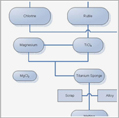Production
Production of Titanium
The first step in the production of sponge involves the chlorination of titanium-containing rutile-ore, which is derived from Australian beach sand. Chlorine and coke are combined with the rutile to produce titanium tetrachloride (TiCl4), which is then reacted with magnesium in a closed system. The by-products are sponge and magnesium chloride. Using the Vacuum Distillation Process, or Kroll-leach process, the magnesium and mag chloride are removed to be recycled.
The sponge is melted with scrap and/or alloying elements such as vanadium, aluminum, molybdenum, tin, and zirconium in a Vacuum Arc Reduction furnace (to produce VAR ingots) or in an Electron Beam (EB) Cold Hearth furnace, to produce remelt electrodes which can then be VAR melted (typically to meet aerospace requirements) or direct cast to slabs.
VAR ingots (cylindrical shapes weighing up to 17,500 pounds) are forged to slabs or rectangualr shapes) or billets (bar shapes). Ingots are also used for investment casting stock.
Mill products result from the rolling or further processing of forged or cast slab or billet into titanium plate, sheet (which can be cut into strip and then be formed into tube or pipe), bar, rod, and titanium wire forms.

Your Title Goes Here
Click here for a larger image of the Titanium Process Diagram.
Technical information
Titanium Weight Formulas
Round
Lbs per linear foot = 1.5369 x dia2
Lbs per linear inch – 0.1281 x dia2
Rectangles/Squares (width = thickness)
Lbs per linear foot = 1.9568 x thickness x width
Lbs per linear inch = 0.1631 x thickness x width
Circles (Disks)
Lbs per linear foot = 1.6211 x dia2
Lbs per linear inch = 0.1351 x dia2
Lbs per piece = thickness x input2 x 0.128
Rings
Weight of Rings in Lbs =
Sheet/Plate
Lbs/Square Foot = Thickness x 23.472
Weight per piece = Thickness x width x length x 0.163
Pipe/Tubing
Lbs/Square Foot = Thickness x 23.472
W = 6.14 (OD-T)T
Skelp Size: (OD-T) x 3.14
W = weight in lbs/ft
OD = outer diameter in inches
T = thickness of the tube wall in inch

